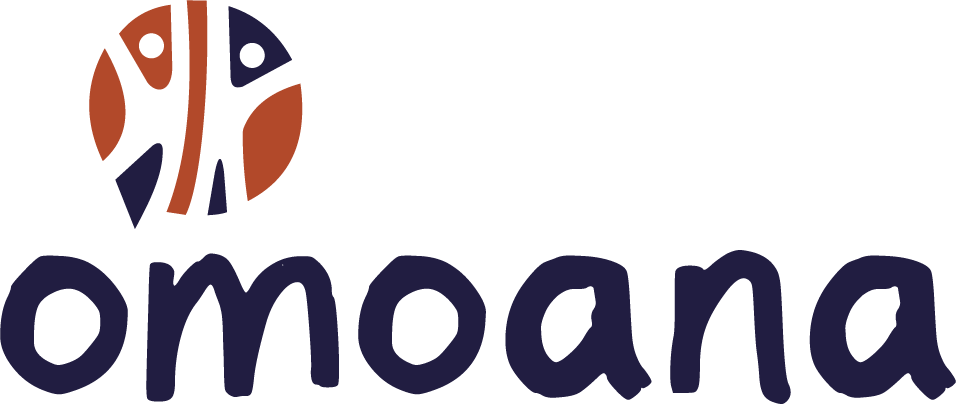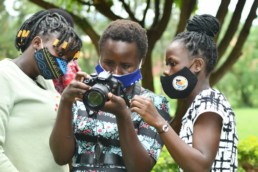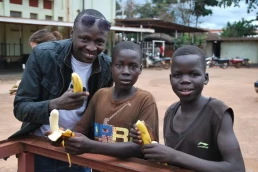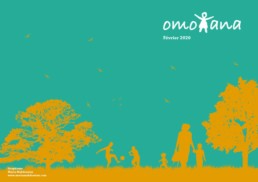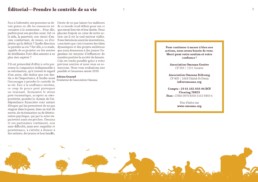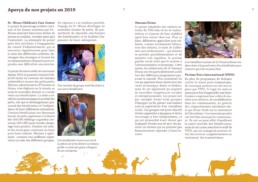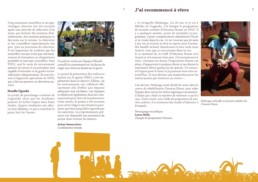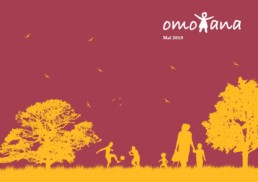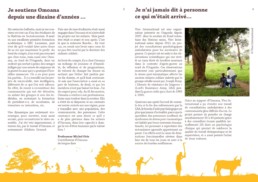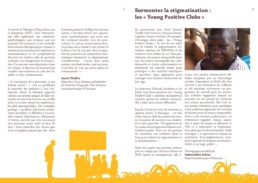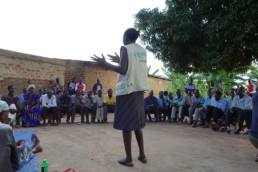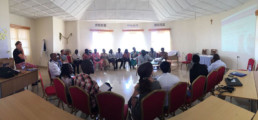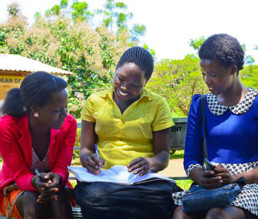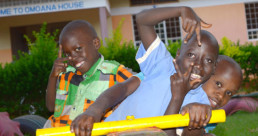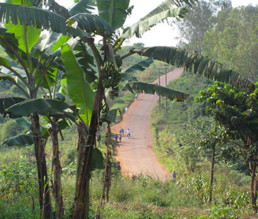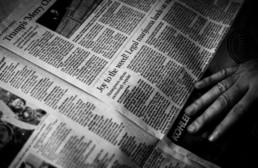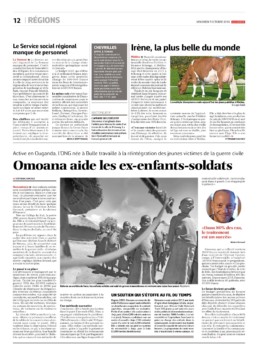Uganda faces the Covid-19 pandemic
Between April and July this year, Uganda experienced a rising rate of Covid-19 infections. This put a strain on the country’s health system, as evidenced by the number of deaths and hospitalisations linked to Covid-19. At the beginning of June, a national lockdown was declared for a period of six weeks. This measure enabled the country to control the rate of infection among the population and to provide healthcare for the most seriously ill.
Today, the country is opening up again. The infection rate has fallen from 21% to 8%, the number of deaths is down and the population is more respectful of preventive measures. The lifting of confinement at the end of July has enabled the transport sector and certain commercial sectors to start operating again. However, other sectors remain closed, including educational establishments, social and religious community gatherings and the entertainment and leisure sector.
Vaccination of the population is underway, with priority given to essential workers and people suffering from chronic illnesses. The government’s objective is to vaccinate 50% of the Ugandan population to enable the country to control the infection rate. However, to date only 1.2% of the population has been vaccinated. Funds to help victims of the pandemic have been paid out to the most vulnerable people. 500,000 of them have received UGX 100,000 (USD 29) for one month. The government is also supporting research into national treatments for Covid-19. Clinical trials of Ugandan plant-based treatments (COVIDEX and COVICYLE) appear to be showing good results.
Impact of the pandemic on projects
The prolonged and repeated closure of schools has exposed children to problems such as child labour, teenage marriage, dropping out of school and violence, which seem to affect girls more than boys.
In this context, Omoana has encouraged its beneficiaries to adapt to virtual learning platforms provided by schools or the government, such as radio-based study programmes for primary school pupils and distance learning models for secondary and tertiary school pupils.
Our education project partners, St Moses and Handle Uganda, provided additional monitoring of students and tutors to avoid failures that could affect the continuation of schooling when the schools reopen.
The activities of Omoana House also had to be adjusted. Additional security measures were put in place to restrict access by outsiders to the rehabilitation centre in order to protect children at high risk of vulnerability to the virus (particularly HIV-positive children). Additional nutritional supplements were offered to the children to boost their immunity.
During this period, the health of the children reintegrated into their communities was closely monitored and antiretroviral treatment was provided to them at home by the Village Health Teams (VHTs). Peer educators also adapted by approaching beneficiaries directly on social networks (Facebook and Twitter), conducting targeted awareness campaigns and offering individual support.
The mental health project’s operations were mainly affected by restrictions on the number of passengers per vehicle and inter-regional transport. Activities such as community awareness-raising were interrupted due to the ban on gatherings.
Many beneficiaries also face mental health problems due to depression, stress and the stigma attached to people affected by Covid-19. There is a great deal of uncertainty about the country’s health and economic future.
Immaculate Achan
Country coordinator
Uganda's youth in search of new horizons
Michael's voice on the phone is calm and determined. "We've been swamped with work since the confinement ended," he says from Gulu, the main town in northern Uganda.
Michael Ojok, 32, heads up Hashtag Gulu, a non-governmental organisation that offers support and reintegration programmes for children forced to live on the streets and do whatever jobs they can find to manage to eat every day.
He describes how many young people in Gulu, and in most of Uganda, have had to face up to the difficulties of a very closed labour market and a changing economy hit hard by the health crisis. Lacking opportunities, many are forced to make extreme choices.
For Michael, the education system does not prepare young Ugandans sufficiently: “The level of education is high, but the system produces more graduates than the market can absorb. A young person who concentrates solely on his or her studies will have less chance of finding a job on leaving school. You get your paper but you have to find ways of surviving. They should be taught practical skills. That way, manual jobs would not be a last resort. Young people need more support.”
So, to avoid the worst, many try to set up their own business. They put in an enormous amount of energy and develop new ideas. Unfortunately, loans that are virtually inaccessible and skills that weren’t on the school curriculum (customer management, networking, etc.) soon get the better of their ambitions. The road is bumpy.
Even more so when, in the lives of these young people, a civil war that lasted nearly 20 years has left deep psychological scars: aggression in everyday relationships, frequent nightmares, tremor attacks… and the stigmatisation of those who, within a community or among family members, suffer from these symptoms. “It’s a subject that nobody talks about openly. There’s no attempt to remember,” laments Anett Pfeiffer Tumusiime, director of the Vivo Uganda NGO supported by Omoana.
"Even within a couple, the tendency is to hide the horrors that may have happened during this period. But everyone was affected. In terms of mental health, what happened 20 years ago is as vivid as if it had happened yesterday."
— Anett Pfeiffer Tumusiime, director of the NGO Vivo Uganda supported by Omoana
Vivo Uganda contributes to Hashtag Gulu’s efforts by offering narrative therapy sessions to the beneficiaries of Michael Ojok’s NGO. This partnership has also enabled some members of the Hashtag Gulu team to receive training specifically focused on trauma treatment. In this way, the two organisations are able to provide psychological help to the most traumatised people. In some places, support groups have been spontaneously set up to provide financial assistance to former child soldiers. Radio programmes also help to break the silence and reduce stigmatisation. “Change is happening gradually, but it’s a long and complex process,” explains Immaculate Achan, country coordinator for Omoana.
“This process is essential,” points out Anett, “because today’s parents were children during the civil war. It is those who suffered most from the acts committed during this conflict who are now raising the next generation.“
At the other end of the phone, Michael, the father of a little girl, would like to see more. He recognises the importance of such a conversation “to make sure that such violence never happens again“, but pleads for a subtle balance: “How can we acknowledge the atrocities committed while not focusing on them? I think it’s time for us to move from the role of victims to that of survivors. We have to ask ourselves: how can I make plans and succeed in what I undertake without constantly returning to this conflict? That’s the challenge: to move away from the story of this war and focus on the challenges that lie ahead. We can’t keep blaming the current situation on the civil war, something has to change. What opportunities are there and how can the younger generation access them?“
Combating gender-based violence: getting men involved
Since January 2018, with the support of Omoana, Handle Uganda has been implementing a project to prevent gender-based violence. This helps to foster a family dynamic that is conducive to children’s well-being. Here is a description…
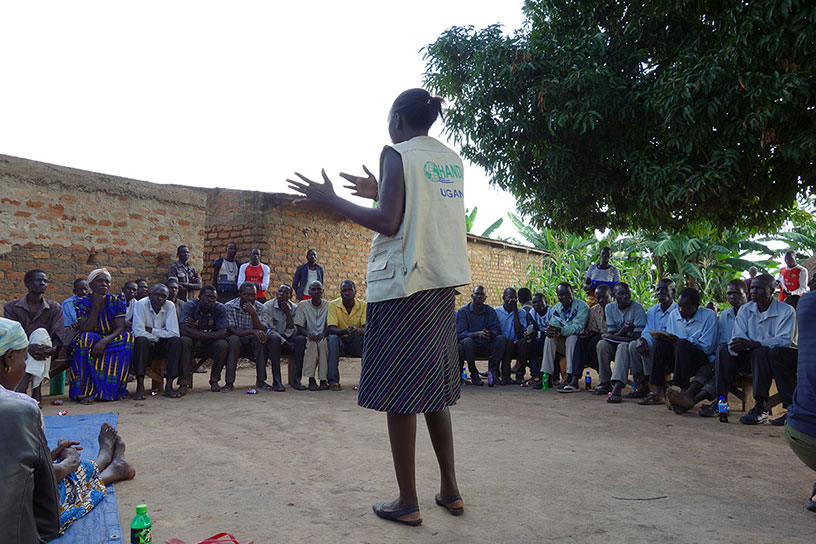
HANDLE Uganda is a small local NGO based in Gulu, northern Uganda, a region still coping with the devastating consequences of a twenty-year civil war. The organization has begun a three-year project in the Nwoya district to combat gender-based violence (GBV), which was widespread in northern Uganda during and after the conflict. This ambitious project is developing a multi-dimensional, holistic approach to tackling GBV at individual, family, community and local government levels.
In addition to various types of physical violence, GBV also takes the form of unequal access to land ownership and to different means of production and sources of income. To remedy this situation, HANDLE promotes women’s rights and equality with men by providing 300 women living in poverty with support in setting up village savings and credit associations (AVEC) to boost their financial literacy. In addition, the organization provides training and support in the creation and management of micro-enterprises.
The aim is to strengthen women’s financial independence in relation to men, so that they can become more autonomous and move towards a position of parity.
These women are also informed about their rights and what defines GBV, so that they can recognize the various forms of discrimination and violations against them. They receive information on what they can do if they or women around them are victims of GBV. They are also provided with the resources they need to access legal and medical services. To this end, HANDLE has a legal representative who supports victims by directing them to the appropriate services for the most serious cases, and by providing a mediation service for families in cases of marital disputes.
HANDLE also provides support in the event of land disputes, to limit the dramatic turn these often take. A mediation service is available to families and communities affected by such problems, as well as legal support if required. While denial of access to property is in itself an infringement of women’s rights, it often degenerates into physical violence, particularly in a population still traumatized by civil war. It is therefore important not to overlook this issue.
With men too…
The project is not limited to women, however. HANDLE also trains groups of male role models, made up of men of varying levels of influence and social background, from farmers to Rwotkweris (clan leaders). Three groups of thirty men each receive intensive training to act as vectors of change within their villages and communities. They learn about GBV, women’s rights and what they can do to influence and educate members of their community.
Each man is a role model for his family and neighbors, and works intensively with ten families in conflict situations, with a particular focus on GBV. The role models also receive basic training in counseling and conflict management in cases of GBV. They are also provided with bicycles to help them carry out their community mobilization and mediation duties.
HANDLE also works closely with local government, police and other stakeholders to strengthen its initiatives. In conjunction with the relevant authorities, the organization carries out important community awareness-raising work through cultural events. On these occasions, the various leaders speak out against GBV and inform their communities of its harmful consequences. Police forces, for their part, are trained on how to recognize cases of GBV and report the crimes committed, as well as on the importance of reporting cases as quickly as possible and preserving evidence, especially in cases of sexual violence.
HANDLE is looking forward to working with various partners and beneficiaries to improve the quality of life of women, men and children in their communities and help reduce GBV in the region.
Emma McGeachy
A network of peace promoters in Africa's Great Lakes region
With the support of the Fédération Genevoise de Coopération (FGC), Omoana and Eirene Suisse set up a workshop to share different practices for people traumatised by war in the Democratic Republic of Congo (DRC), Rwanda and Uganda. Read the story.
The regional partners of Eirene Switzerland and Omoana met for 6 days in the town of Huye, around a hundred kilometres south of the Rwandan capital Kigali. Some of the 25 participants came from Uganda (Handle, ACOT and Vivo, Omoana), others were almost at home (the Rwandan associations Réseau des femmes, Umuseke and Association Modeste et Innocent), while the representatives of Pole Insitute came from the Democratic Republic of Congo. Omoana coordinator Magali Perrin and committee member Sophie Grangier were also present.
Taï Chi and meditation
The ambition of this workshop was big: to bring together organisations from different countries to share their working methods, even though the participants do not speak the same language. Nonetheless, these organisations share a common objective, each working in their own region and in their own way to support traumatised people. Ugandan NGOs use psychology to help people affected by the country’s conflicts to rebuild their lives. Rwandan NGOs use social therapy to help reconcile communities that collapsed during the genocide.
Despite language barriers, participants were skilfully encouraged to mix. Exchanges between English-speakers and French-speakers flourished, despite a timid start in which participants were divided into two groups, with the “pro-Molière” and “pro-Shakespeare” groups on one side. After a while, some people spontaneously got together at dawn to organise Tai Chi and meditation sessions. The participants discovered the discussion groups in which genocide survivors and former genocidaires meet to discuss and help each other. This is a relatively common occurrence, particularly in the context of compensation payments to be made by former prisoners to their victims, one of the components of the national reconciliation process.
Future cooperation
The final day of the gathering was devoted to a visit to the social therapy project set up by the Association Modeste et Innocent since 2013 with the support of Eirene. The participants and beneficiaries of the social therapy were divided into small groups to share their life stories. During these discussions, the participants were able to see the extent of the work accomplished by Noëlla, Médiatrice and Gilbert, the AMI facilitators. In one of the groups, two neighbours explained their different experiences during the genocide. One lost part of his family to the other. However, thanks to dialogue and exchange, they now meet regularly in discussion groups, enabling them to move beyond the unspeakable.
The participants were impressed by the work they had done and were keen to apply it at home. This had a particular resonance for one participant from the DRC, who deplored the lack of effort in his country to work towards a process of reconciliation. As is often the case in Rwanda, the visit ended with an impromptu party during which the participants danced to Rwandan rhythms and discovered the region’s culinary specialities.
On the day of departure, the participants spontaneously exchanged their contact details. Following a final exchange “Marketplace” exercise, the participants shared the methods that interested them in the other. A few months after the end of this workshop, there are already collaborations between organisations that wish to send one of their leaders on an immersion visit to the other structure, but also pooling of strengths in order to build more ambitious projects. By bringing together our partners in the Great Lakes region, with the financial support of the Fédération Genevoise de Coopération, we are strengthening the work carried out by these organisations and facilitating the dissemination of effective local practices.
Bastien Morard
Great Lakes Programme Manager
Eirene Suisse
The right to education: a reality?
Some children from particularly deprived families would not be able to continue their education without outside help. Because their families are unable to pay for their education, they are forced to drop out of school for lack of resources, and like so many others, have to make do with a hand-to-mouth existence. However, school sponsorship projects are there to support and accompany families in need, not to replace them.
Omoana works in partnership with 2 separate associations which implement the school sponsorship projects. The first partnership began in 2003, in the south of the country, with St Moses CCC (St Moses Children’s Care Center and Community Development), founded in 1973 as a center for abandoned, destitute and displaced children. It currently sponsors a total of 163 children, 66 of them through Omoana. Where necessary, the center provides accommodation for some of the children. Activities include counseling, guidance and psychological support, as well as medical follow-up. Emphasis is placed on the development of social skills and Christian education for all children, whether resident or not. Finally, the association ensures the payment of school fees and the follow-up of pupils. Community and sustainable family development is promoted through training, follow-up and support via a microfinance project.
A second sponsorship project was set up in the north, in the post-conflict region of Gulu, in 2009. It is currently managed by HANDLE Uganda (Hope Alert Network for Development and Local Empowerment), an NGO founded in 2009 to fill gaps in service provision to communities undergoing rehabilitation and reconstruction. The project supports 29 students at various levels of education, from primary to vocational schools and university. Activities are broadly similar to those at St Moses, with the exception of the residents’ center. Team members are based in the city of Gulu and travel to follow up students. They visit families to discuss day-to-day issues, and understand the context in which the wards live. They also visit teaching centers to pay school fees and review progress with teachers.
There are many issues at stake, particularly school drop-out and failure. Some parents don’t play their part in the equation, for financial reasons or because they’ve resigned. As a result, the boundary between the involvement of project teams and the role of families is difficult to define. Families pay part of the school fees, but can we ignore a child who can’t study for lack of basic school equipment? At the same time, expectations, whether justified or not, are sometimes very high, and some parents rely completely on the associations to manage the difficulties.
The project teams must create a climate of trust that encourages dialogue with the pupils and their families; they must listen to everyone’s difficulties and find solutions on a case-by-case basis: who needs to change to a vocational school because of academic difficulties, who needs to leave the program because of breaches of trust, who needs to go to boarding school to escape the overload of housework that prevents study or to have access to a better quality school, etc.?
It’s worth noting that in Uganda, children take on a lot of responsibility at a very early age, especially girls. They are in charge of domestic chores – fetching water from the well, cooking, cleaning – and at the same time looking after younger children or sick relatives. These obligations are not going to diminish because they have to study. And then there are the girl mothers with no husbands and no resources, the onset of adolescence, the sometimes enormous distances involved in getting to school, to name just a few of the many problems.
To top it all off, the quality of the public school system in Uganda is a real problem, especially in remote areas, and the cost of schooling continues to rise as a result of inflation and the government’s limited involvement in its development.
My intention is not to paint a gloomy picture of the situation, but rather to highlight the infinite number of peculiarities facing the staff engaged in this work.
In conclusion, given the growing number of children in need, the means deployed to help these families are not enough. By enabling a child to attend a normal school and pursue a secondary education, you are offering him the chance to build a real future for himself, and to participate in the development of his country in the future. And he thanks you most sincerely.
Magali Perrin
Coordinator
Visit from humanitarian professionals
Omoana House, much more than a project
In April 2016, humanitarian professionals engaged in a Certificate in Project Methodology with the Centre d’étude et de recherche en action humanitaire (CERAH) visited Omoana House. They were gathered for 10 days in Uganda for the “residential” part of the training (a distance learning course that lasts 7 months and also includes distance sessions and 4 months of coaching). A practical case study was organized with Omoana House, during which the students talked to HIV-positive teenagers about their daily challenges and how Omoana House meets them. Beyond the technical aspects, the group was struck by the courage of these young people, and by the human relationship with the staff. For their part, the teenagers appreciated this moment of exchange, which highlighted the need to include them more systematically in project planning. Dr. Edith Favoreu, trainer and deputy director of CERAH, gives us her impressions.
Omoana… more than a name, it’s poetry. It’s a path to a bubble of happiness, bursting with positive energy for children and visitors alike. While the former find a loving, caring refuge, a den of unparalleled human warmth, the latter draw a life force that leaves a lasting impression.
Omoana… more than a project, it’s an innovative concept, where the being is placed in its central, primary, primordial dimension, where each of its components is recognized as an inexhaustible source of inner transformation. Omoana is unique and its power immeasurable.
Omoana … more than a support, it’s a true inspiration. Children, young adults and caregivers are role models, giving full meaning to the concept of resilience. Never denying the intrinsic complexities of the country’s social, health, political and economic situation, each of them nevertheless grasps them, a real life lesson for every visitor.
We were moved to witness such greatness. Lucky to be able to spend a day at Omoana House, fortunate to share a little of the daily life of this unique home. We, humanitarian and development professionals. We, accustomed to difficult contexts in which suffering has so many faces. We, who believe that our work can contribute to limiting this suffering and restoring hope. We have all been overwhelmed and enthused by these precious moments with the children, the teenagers and the entire team who have invested so much. We left Jinja different, better, stronger, taller, and so full of admiration.
We, coming from all over (Brazil, Senegal, Switzerland, France, Sudan, Ethiopia, Cameroon…), working for the University of Geneva, the International Committee of the Red Cross, the World Food and Agriculture Organization, NRC, etc., all involved in a high-level university training program, thank you. We thought we’d lend our support to Omoana House, investigating with the young people how they perceive the center and their perspectives. We had thought it would be an exercise in needs analysis, in which techniques and tools would be applied, all colored by interpersonal skills. Our impression is that we’ve learned far more than we’ve contributed, received far more than we’ve given, and grown far more than we’ve contributed.
Omoana House, your work is unfortunately indispensable. The way you develop it is admirable. Thank you for giving substance to the words solidarity, compassion and love. Thank you for welcoming us for this day of study transformed into a life lesson.
Dr. Edith Favoreu
Assistant Director
CERAH
Université de Genève/Institut de Hautes Etudes Internationales et du Développement
Editorial by the President, january 2017
More refugees fled to Uganda than to Europe in 2016. According to Norwegian Refugee Council, 489,000 South Sudanese took refuge in Uganda, while 362,000 crossed the Mediterranean. This reminds us of something. During humanitarian crises that shake the planet, the first to come to the aid of those affected are those close to them. During wars or epidemics, it’s neighbors and families who come to the aid of people who may be dying.
What does this mean? That the bulk of the work is carried out by local people, not by dedicated Europeans who, in addition to the many refugees welcomed into their own countries, fund humanitarian organizations. No, in Uganda as in the Middle East, people are not just victims or executioners. They are also home to the main heroes who, with empathy and courage, come to the aid of those in need.
In their work, Omoana and its partners have seen the key role played by communities in tackling crises. It is often grandmothers who care for orphaned and HIV-positive children. It is the communities that have supported traumatized child soldiers returning to their villages, and it is the Ugandans who are the main players in the reception of South Sudanese. Indeed, the Bidibidi camp alone receives more than 270,000 refugees, the equivalent of twice the population of the city of Lausanne.
Beneficiaries must be consulted, as they are in the best position to respond to the main problems, express their needs and, above all, suggest activities to deal with them. This is why the association must implement a participative approach for each project. We thank you, dear donors, for believing and wish you all the best for 2017.
Adrien Genoud
President
